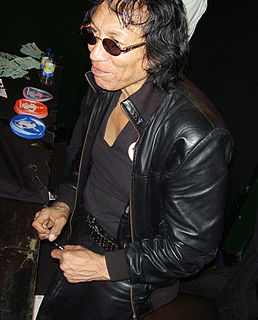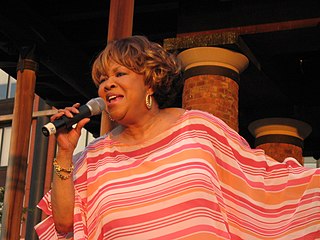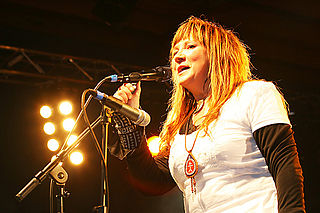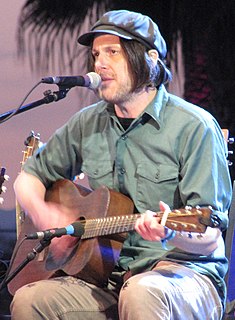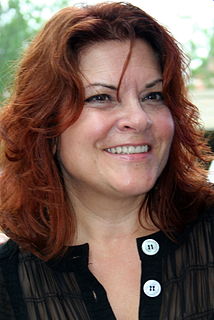A Quote by Sixto Rodriguez
I think that many of the issues they were facing in South Africa were the same as those I was singing about. Conscription, resisting the draft, government repression - I mentioned all those things in my songs.
Related Quotes
We enjoyed the fact that we were called to the folk festivals and we got to know Joan Baez, Dylan. We were singing strictly gospel, but then after we started hearing songs that they would sing, we saw that those songs were very fitting for us because they were singing the truth, and truth is gospel.
Right after undergrad, I started doing low-level work on health issues in sub-Saharan Africa, and what struck me was the disconnect between how people in New York would speak about some of the issues people were facing. At the time, 2006-ish, there were a number of big media campaigns to raise awareness about HIV in sub-Saharan Africa.
Now many things are beginning to come out and it was truly a reality to me when I went to Africa, to Guinea. The little things that had been taught to me about the African people, that they were "heathens," "savages," and they were just downright stupid people. But when I got to Guinea, we were greeted by the Government of Guinea, which is Black People - and we stayed at a place that was the government building, because we were the guests of the Government.
I remember Emilio [Estevez] and I were at John's house during the rehearsal process. And John [Huges] had mentioned he wrote the first draft of Breakfast Club in a weekend. And we both at the same time went, "First draft? How many do you have?" And John said he's got four other drafts. And we go, "Can we read them?" And for the next three hours, Emilio and I read those other four drafts.
I know that in South Africa, we were in that space, and we're still suffering from that space. And that was where a government very successfully convinced the majority of a population that every single person there was blocking the other people from achieving greatness in the country, only to realize that we were all being oppressed at the same time. That's one of the biggest things. And I'm proud to say that.
And I thought about how many people have loved those songs. And how many people got through a lot of bad times because of those songs. And how many people enjoyed good times with those songs. And how much those songs really mean. I think it would be great to have written one of those songs. I bet if I wrote one of them, I would be very proud. I hope the people who wrote those songs are happy. I hope they feel it's enough. I really do because they've made me happy. And I'm only one person.
If you were at Lehman, the same thing happened. If you were at AIG, the shareholders are getting creamed on these things. And those shareholders are not just a bunch of big shots in Wall Street. Those are pension funds, and those are investors all over the country. I wouldn't worry too much about that. Justice won't be perfect on it.
I always wanted to sing, I always loved to sing. As a child I was singing all the time, and my parents were singing all the time, but not the traditional songs because they were very Christian; the Christian Sámis learnt from the missionaries and the priests that the traditional songs were from the Devil, so they didn't teach them to their children, but they were singing the Christian hymns all the time. So I think I got my musical education in this way. And of course the traditional songs were always under the hymns, because it doesn't just disappear, the traditional way of singing.
I think the songs I was writing after Aeroplane were full of a lot of undealt-with pain that was just a little too big... the issues seemed too large for me to confront intuitively through songwriting. I kept pushing it and pushing it. There are so many issues about being human and why people inflict pain on each other. There were seeds of all these things I hadn't dealt with. With just the personal issues, I felt I was in over my head, but then to write about it... To write you have to have at least a little bit of confidence you know what you're talking about.
When I was 18 years old, I went on the road with my dad after I graduated from high school. And we were riding on the tour bus one day, kind of rolling through the South, and he mentioned a song. We started talking about songs, and he mentioned one, and I said I don't know that one. And he mentioned another. I said I don't know that one either, Dad, and he became very alarmed that I didn't know what he considered my own musical genealogy.
On many key global economic issues, Russia's loyalty is divided between the West and the South. As an energy exporter, it stands opposite energy importing China and India. As a commodity trader resisting the influx of cheap Chinese manufactures, its interests in the WTO clash with those of many of the developing economies.
South Africa is not Cameroon. It's a strong economy. I think they should be the first ones setting an example - improving the legal punishments for those that are involved, reinforcing the borders from every angle, meaning that even the diplomatic plane that lands in South Africa should not have the green light to leave without having the plane inspected. Obviously, those guys are often involved. If I get killed for saying that, so be it. That is the fact. There's way too many important people that are involved that don't want to change.
